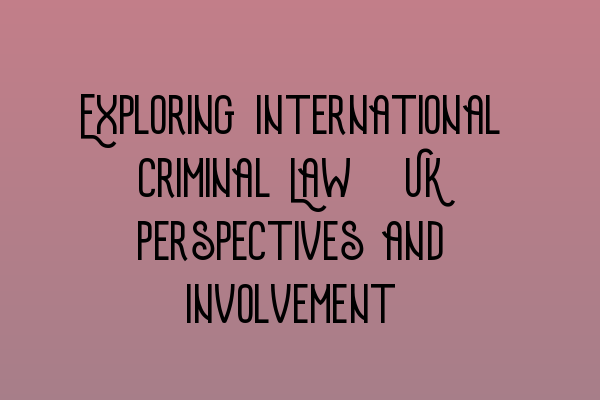Exploring International Criminal Law: UK Perspectives and Involvement
International criminal law is an essential field that plays a crucial role in promoting justice and holding individuals accountable for heinous crimes committed on a global scale. As a prominent legal jurisdiction, the United Kingdom has made significant contributions to the development and enforcement of international criminal law. In this blog post, we will delve into UK perspectives and involvement in international criminal law, highlighting key cases, legislation, and the country’s role in international tribunals.
1. Historical Significance
The UK has a rich history when it comes to the development of international criminal law. The Nuremberg Trials that followed World War II marked a turning point in the prosecution of war crimes, crimes against humanity, and genocide. It was during these trials that the concept of individual criminal responsibility was firmly established.
Since then, the UK has been actively involved in drafting and implementing important international legal instruments, such as the Genocide Convention, the Geneva Conventions, and the Rome Statute of the International Criminal Court (ICC). These efforts reflect the UK’s commitment to upholding international human rights standards and ensuring justice for victims of international crimes.
2. Key UK Cases and Legislation
The UK has played a significant role in prosecuting individuals for international crimes. One notable case is the prosecution of Charles Taylor, the former President of Liberia, for war crimes and crimes against humanity committed in Sierra Leone. The trial, held at the Special Court for Sierra Leone in The Hague, demonstrated the UK’s commitment to bringing perpetrators of international crimes to justice.
Moreover, the UK has enacted domestic legislation to ensure effective prosecution of international crimes. The International Criminal Court Act 2001, for example, provides the legal framework for cooperation with the ICC and the prosecution of crimes covered by the Rome Statute. Additionally, the War Crimes Act 1991 enables the UK to prosecute individuals for war crimes committed anywhere in the world, regardless of their nationality or the place where the crimes occurred.
3. UK Involvement in International Tribunals
The UK has played a crucial role in the establishment and functioning of various international tribunals. The International Criminal Court, for instance, has had strong support from the UK since its inception. The country has actively supported the ICC’s investigations and prosecutions, as well as contributed to its budget and provided personnel for various positions within the Court.
Furthermore, the UK has participated in other international tribunals, such as the International Criminal Tribunal for the former Yugoslavia (ICTY) and the International Criminal Tribunal for Rwanda (ICTR). The UK’s involvement in these tribunals demonstrates the country’s dedication to ensuring justice and accountability for international crimes committed during conflicts.
4. Future Outlook and Challenges
While the UK has made significant contributions to international criminal law, challenges remain in the pursuit of justice. One key challenge is the impending departure of the UK from the European Union (EU). Brexit will have implications for the UK’s cooperation with EU member states on matters of international criminal law, such as extradition and mutual legal assistance.
Additionally, the evolving nature of international crimes, such as cyber warfare and terrorism, poses new challenges for the UK and its involvement in international criminal law. It is essential for the UK to adapt its legal framework and international cooperation mechanisms to effectively address these emerging threats.
In conclusion, the UK has played an important role in the development and enforcement of international criminal law. The country’s historical significance, key cases and legislation, involvement in international tribunals, and future outlook all contribute to its prominence in this field. As the UK continues to navigate through new challenges and changes, its commitment to international criminal justice remains unwavering.
Related Articles:
- LLC Formation Made Simple: Step-by-Step Guide for UK Entrepreneurs
- Business Regulations in the UK: A Comprehensive Overview
- SQE Workshops and Webinars: Accelerate Your Exam Preparation
- Delaware Corporate Law for UK Solicitors: Key Insights and Practices
- Demystifying the Solicitors Qualifying Examination Format
